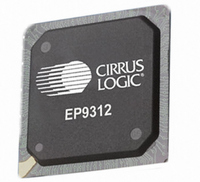EP9312-CB Cirrus Logic Inc, EP9312-CB Datasheet - Page 186

EP9312-CB
Manufacturer Part Number
EP9312-CB
Description
System-on-Chip Processor
Manufacturer
Cirrus Logic Inc
Series
EP9r
Datasheets
1.EP9307-CRZ.pdf
(824 pages)
2.EP9312-IBZ.pdf
(4 pages)
3.EP9312-CB.pdf
(62 pages)
4.EP9312-CB.pdf
(17 pages)
Specifications of EP9312-CB
Peak Reflow Compatible (260 C)
No
A/d Converter
12 Bits
Leaded Process Compatible
No
No. Of I/o Pins
65
Package / Case
352-BGA
Core Processor
ARM9
Core Size
16/32-Bit
Speed
200MHz
Connectivity
EBI/EMI, EIDE, Ethernet, I²C, IrDA, Keypad/Touchscreen, SPI, UART/USART, USB
Peripherals
AC'97, DMA, I²:S, LCD, LED, MaverickKey, POR, PWM, WDT
Number Of I /o
16
Program Memory Type
ROMless
Ram Size
32K x 8
Voltage - Supply (vcc/vdd)
1.65 V ~ 3.6 V
Data Converters
A/D 8x12b
Oscillator Type
External
Operating Temperature
0°C ~ 70°C
Processor Series
EP93xx
Core
ARM920T
Data Bus Width
32 bit
3rd Party Development Tools
MDK-ARM, RL-ARM, ULINK2
Lead Free Status / RoHS Status
Contains lead / RoHS non-compliant
Eeprom Size
-
Program Memory Size
-
Lead Free Status / Rohs Status
No
Other names
598-1257
Available stocks
Company
Part Number
Manufacturer
Quantity
Price
Part Number:
EP9312-CB
Manufacturer:
CIRRUS
Quantity:
20 000
- EP9307-CRZ PDF datasheet
- EP9312-IBZ PDF datasheet #2
- EP9312-CB PDF datasheet #3
- EP9312-CB PDF datasheet #4
- Current page: 186 of 824
- Download datasheet (13Mb)
7
7-4
Raster Engine With Analog/LCD Integrated Timing and Interface
EP93xx User’s Guide
7.3.2 Color Look-Up Tables
7.3.3 Grayscale/Color Generation for Monochrome/Passive Low Color
7.3.4 Frame Buffer Organization
to one pixel combination blinking. For 16 bpp and 24 bpp modes, the LUT blink circuitry is
usually bypassed and the blink functions are logic transformations of the pixel data. In
addition to logical AND/OR/XOR LUT address translations, the circuitry will support logical
blink to background, blink dim, blink bright, and blink to reverse.
The raster engine block contains dual color pixel LUTs (Look-Up-Tables). Each LUT will allow
the engine to output 256 different pixel combinations of 24-bit pixels in lower color depth
modes.
The video pipeline includes circuitry that can be configured to provide grayscale or color
generation for generating grayscales on monochrome displays or adding color depth on low
color LCD displays, respectively. For monochrome displays, the circuitry supports up to 8
grayscale shades including on and off. For low color LCD displays, the circuitry supports up
to 512 colors. The circuitry does this by rapidly turning on and off (dithering) pixels based on
frame count, screen location, and pixel value. For grayscale displays, the pixel gray
appearance is determined by 3 bits of the pixel data. For color depth expansion on LCD
displays, the pixel color appearance is determined by 3 bits each from the red, green, and
blue portions of the pixel data.
The Raster Engine is designed to support video information as DIB (Device Independent
Bitmap) format stored in a packed pixel architecture. However, the engine does not require
that video information be stored in a packed line architecture. The circuitry allows a different
memory organization between video scan out and graphic image memory. Therefore,
memory gaps can exist between lines. This means that the graphics memory may be
organized wider than the video frame. This type of feature could be used for left and right
panning of the displayed information. The video frame buffer can be located in main memory,
or in a dedicated video frame area. The beginning of video lines can be located on any word
boundary. This architecture allows efficient use of memory regardless of the active video line
length. Video screen start registers determine the upper left corner of the video screen. Video
word addressing in screen memory is from left to right and then from top to bottom. Four-bit
pixels packed within video words are organized in DIB format with the left most pixel in the
Displays
Copyright 2007 Cirrus Logic
DS785UM1
Related parts for EP9312-CB
Image
Part Number
Description
Manufacturer
Datasheet
Request
R

Part Number:
Description:
IC ARM920T MCU 200MHZ 352-PBGA
Manufacturer:
Cirrus Logic Inc
Datasheet:

Part Number:
Description:
IC ARM9 SOC UNIVERSAL 352PBGA
Manufacturer:
Cirrus Logic Inc
Datasheet:

Part Number:
Description:
IC ARM920T MCU 200MHZ 352-PBGA
Manufacturer:
Cirrus Logic Inc
Datasheet:

Part Number:
Description:
IC Universal Platform ARM9 SOC Prcessor
Manufacturer:
Cirrus Logic Inc
Datasheet:

Part Number:
Description:
IC Universal Platform ARM9 SOC Prcessor
Manufacturer:
Cirrus Logic Inc
Datasheet:

Part Number:
Description:
Development Kit
Manufacturer:
Cirrus Logic Inc
Datasheet:

Part Number:
Description:
Development Kit
Manufacturer:
Cirrus Logic Inc
Datasheet:

Part Number:
Description:
High-efficiency PFC + Fluorescent Lamp Driver Reference Design
Manufacturer:
Cirrus Logic Inc
Datasheet:

Part Number:
Description:
Development Kit
Manufacturer:
Cirrus Logic Inc
Datasheet:

Part Number:
Description:
Development Kit
Manufacturer:
Cirrus Logic Inc
Datasheet:

Part Number:
Description:
Development Kit
Manufacturer:
Cirrus Logic Inc
Datasheet:

Part Number:
Description:
Development Kit
Manufacturer:
Cirrus Logic Inc
Datasheet:

Part Number:
Description:
Ref Bd For Speakerbar MSA & DSP Products
Manufacturer:
Cirrus Logic Inc












